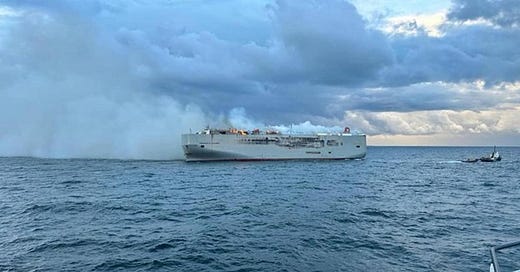In July 2023, a ship loaded with cars caught fire off the coast of the Netherlands and burnt for several days. The Dutch coast guard and seaborne fire-fighters stood by the vessel and focused on keeping the hull from overheating, so it didn’t leak fuel or sink.
The vessel, the Freemantle Highway, twice the length of a football field had left the German port of Bremerhaven bound for Singapore with almost 3,800 vehicles on board, many of which were made by BMW and Mercedes-Benz. Electric cars (EVs) and construction vehicles were among the cargo.
The 23-person crew - 21 of whom were from India - tried to fight the flames but had to abandon ship, some of them leaping into the water and sustaining injuries before being rescued by helicopter. There was one fatality.
[It is also noteworthy to point out that Shoei Kisen Kaisha, the Japanese firm that owns the Freemantle Highway, is also the owner of the Ever Given, the huge container ship that got stuck in the Suez Canal in March 2021.]
According to the Dutch coastguard, the cause of the blaze is still unknown, and they have denied reports that the fire broke out in a section of the carrier where EVs were stored.
Other incidents
There have been several instances of ship fires with motor vehicles on board in recent years:
Also in July 2023, in New Jersey, two firefighters based in Newark died while battling a blaze that broke out as used vehicles were being loaded for export on the Grande Costa D’Avorio.
In 2022, the Felicity Ace caught fire in the Atlantic while transporting about 4,000 Volkswagens to the US. An estimated $438 million worth of goods were aboard the ship, $400 million of which were cars.
In June 2020, the Höegh Xiamen caught fire in Jacksonville, Florida, destroying its cargo of 2,420 used vehicles, according to the German insurance group Allianz. Allianz said the subsequent investigation blamed the cause on an improperly disconnected battery in a used vehicle.
Globally, fire was the leading cause of losses for the shipping industry in 2022, according to Allianz. Eight vessels were lost, and more than 200 incidents were reported - the most in a decade. Allianz has said there have been ‘several incidents’ in recent years where lithium-ion batteries were reported to be contributors to fires on vessels. Such batteries are key in the shift from petrol/diesel engines to EVs, an important part of the ‘battle’ against climate change.
Lithium-ion batteries that ignite are harder to extinguish because they can burn ferociously and are capable of spontaneously reigniting hours or even days after they have been put out. Most ships lack the suitable fire protection, firefighting capabilities, and detection systems to tackle such fires at sea, which has been made more difficult by the dramatic increase in ship size. Container-carrying capacity has doubled in the last 20 years.
This short piece illustrates several synoptic links:
· Global systems: transport of manufactured goods
· Place: Japanese-owned ship; Indian crew; Australian named ship; carrying goods from Germany to Singapore; German insurance company
· Carbon cycle: electric cars to reduce carbon emissions.




